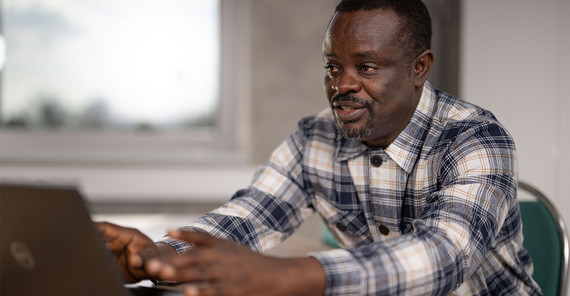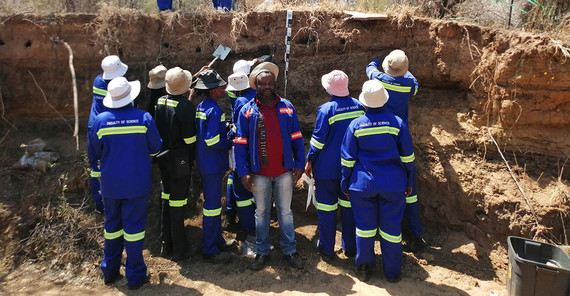Prof. Eze, could you please describe the project you will be working on at the University of Potsdam?
In my project, I am trying to examine the impact of salinity on the clay mineralogy of soils of the semi-arid environment of Botswana. Clays are very important inorganic components of every soil and soil is the basis for existence of lives on our planet because of the many ecosystem functions it supports. A comprehensive knowledge about clay minerals enables us to manage soil structural stability and counteract possible erosion as well as optimize agricultural use of soils. In addition, clay can have a stabilizing effect on organic soil matter and contribute to the fixation of carbon. Salinization is a process typically occurring under dry conditions that can alter the structure and properties of clay minerals. Knowing these processes in detail essentially supports a sustainable soil management.
Why did you apply for a Georg Forster Research Fellowship of the Alexander von Humboldt Foundation?
In general, scientists from developing countries and emerging economies may apply for this grant. To get a Georg Forster Fellowship, the research outline must deal with issues of major relevance to the future development of my home country Botswana. As explained above, my project has to do with soil salinity and soil management in the region where I come from.
What are the advantages of a Humboldt Fellowship?
The fellowship is very robust, it supports you and your family. It also supports your career advancement even at the end of the fellowship, making it quite attractive. Once in a while the Humboldt Foundation organizes network meetings, e.g. in April at the University of Mainz. They provide a valuable platform where scientist like me can meet to foster collaboration. Further, I find it important to learn to speak German, which is supported by the Humboldt Foundation. Last month, I started the course “German for Beginners” at the Center for Languages and Key Competences (Zessko) of University of Potsdam.
Your host at the University of Potsdam is Prof. Stefan Norra, head of the working group “Soil Science and Geoecology”. How did the collaboration come about?
His former working group “Environmental Mineralogy and Environmental System Analysis” is based at Karlsruhe Institute of Technology (KIT). Since 2022, Stefan Norra is leading a group at the Institute of Environmental Science and Geography at the University of Potsdam, closely working together with KIT. I have a friend who is Humboldt fellow at KIT at the moment. Last year I told him about my plans and that I find it very difficult to get a host, because you need the approval of a German host before you can apply for the fellowship. With the help of my friend I was really lucky to contact Prof. Norra. As an experienced soil scientist, he is the perfect host for my project.
What are your plans for the coming months?
During the coming months I will spend most time in the lab analyzing soil samples from Botswana. Using the facilities here on Campus Golm, I will look at the morphology, salinity, and general characteristics of the soils and clay minerals found in these samples. I try to identify the properties of the clay that makes the soil behave the way it behaves. Concerning climate change, the rise in temperature will lead to more dryness of soils in semi-arid environments. One of the effects is the increase in soil salinity. The question I try to answer is, how this will affect the clay mineralogy, structure, and the complex interaction of clay and organic materials in the soil system. Instruments I use include the X-ray diffractometer and a suite of microscopic equipment. Further, I work with inductively coupled plasma mass and optical emission spectrometry.
Which kind of field samples did you collect?
As soon as I got the good news about approval of my fellowship, I immediately launched a one-month field campaign back in Botswana to collect samples of different soil types: Calcisols, Vertisols, Luvisols, and Lixisols. These different types of soil have different kinds of clay in it. Vertisols are known for having shrink-swell clays: they expand when they are wet and they shrink when they are dry. As an opposite, Luvisols are made of clays that do not expand.
Is this your first time to come to Germany and how long will you stay?
This is my first time in Potsdam, but I have been to KIT in Karlsruhe for one week in December 2022. In 2023, I took a sabbatical at my home institution and I will stay here for one year. After returning to Botswana International University of Science and Technology, I will later come back for another half year of research at the University of Potsdam.
Which aspects do you like about Germany and what do you still have to get used to?
First of all, I would say the weather is challenging. Coming from Botswana with 36° Celsius to land at the airport at -2° Celsius the next day it was very cold! But we adapted quite fast. Apart from that, I really like the fact that you don’t need a vehicle to take you anywhere. You can just walk to the next bus stop to get to your destination and they are very punctual. The public transport in Germany is a big plus for me. I also want to emphasize that I met very friendly people here. The working group hosting me is the best of what I could get, especially the group head, Stefan Norra, is so welcoming. My colleague Hauke Sattler took some time to show me the campus and provides helpful assistance with laboratory issues and orientation.
How did the University of Potsdam support you in getting started?
I am here with my spouse and my two children, we live near Neues Palais and not far from Golm. For our kids we got places in the Betriebskita klEinstein nearby. The staff at Welcome Center Potsdam was very supportive, they found the accommodation for us and also arranged child care. Without this great help, I would have been lost after my arrival.


